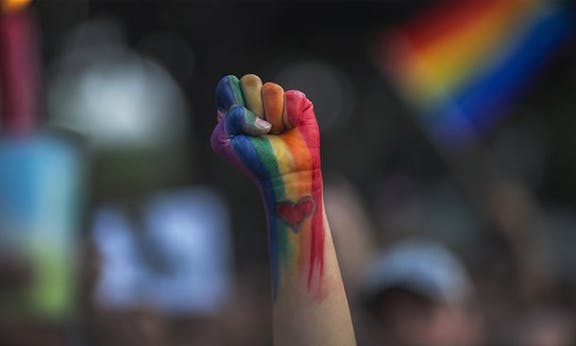We shouldn’t be afraid of a fight for marriage equality

“But this entertainment will not only ruin young lives … it will end some of them.” No, that’s not the tagline to 2012’s summer blockbuster The hunger games. Nor is it from the internal monologue I had each year the morning of my high school swimming carnival. It is about Malcolm Turnbull’s proposed marriage equality plebiscite and is taken from a heartfelt Facebook post by Australian comedian Hannah Gadsby, which has now gone viral.
Hannah talks about her experience growing up in Tasmania in the ’90s, during which a heated debate about homosexuality raged, ultimately leading to the decriminalisation of homosexuality in that state in 1997. She laments the better person she could have been if this toxic debate had never taken place and, indeed, begins her post by stating that the “idea of an ongoing debate around marriage equality makes my stomach turn”.
Similar sentiments have been expressed in Facebook posts that attribute all manner of ills and maladies to the looming marriage equality debate: anxiety, depression, fatigue, inability to form meaningful relationships, the Ten Plagues of Egypt, all the way up to that weasel word of the queer left: “trauma”.
Just in case you missed it: if the plebiscite doesn’t kill you, you will be left a heaving, traumatised, PTSD-suffering mess who will never get a partner. Aside from the fact that being anxious and shit at relationships could aptly describe most people I know between 28 and 40, what does this fear of debate say about us as queers?
To be clear: I’m not writing to advocate a plebiscite. What I am arguing is that debate doesn’t have to be traumatic; conflict can help shape, politicise and empower people.
In 2004, Massachusetts became the first US state to legally recognise same sex marriage. This was when only a handful of nations had legalised marriage equality. So as well as jubilation, among many US queers there was also fear and apprehension that this had perhaps arrived before people were ready.
Jonathan Rauch, a gay journalist, wrote: “I dreaded a national backlash against gay marriage and against gay people”. And that backlash did come. Until the Supreme Court ruling in June 2015, there were 11 years of to-ing and fro-ing over the issue. We saw it used as a wedge issue by more than one politician. We saw it legalised on a state level and then outlawed and then legalised again.
But at the end of it all, LGBTIQ people won and took the majority of the US population with them, with consistent majority support for same sex marriage across the country since 2011.
Even after the Supreme Court ruling, homophobic warriors continued their campaign against marriage equality. Kentucky county clerk Kim Davis made a martyr of herself by refusing to issue marriage licences to same sex couples.
In France, even after the legalisation of marriage equality – “mariage pour tous” – a homophobic campaign by the group Manif’ pour tous (Protest for all) continued, filling the streets with thousands. In Tasmania, the US and France, the passing of pro-LGBTIQ legislation became a focal point for homophobic campaigns. Should queers have simply let sleeping dogs lie and stepped away, lest the homophobic right be unleashed?
No. Rather than cower in fear, activists in all these places did the opposite and squared off against the homophobes. In France, queer activists countered the protests of Manif’ pour tous with protests of their own, hosting all manner of occupations, “kiss-ins” and the like. They also managed to expose that these people were not simply concerned citizens but had deep links to the Catholic Church and the French far right. And in the US, activists fought each battle, each ban and through each defeat until they seized victory.
If a plebiscite were to be on the agenda, of course the No camp would run a vicious, dirty campaign. But how is this different from the regular bile they spit almost daily? A debate is a contest that gives us a platform to counter their hate speech and to cohere young activists around something concrete.
To oppose debate around marriage equality on principle is pessimistic and a capitulation to homophobia. Rather than ruining young lives, a strong Yes campaign could give birth to a whole new generation of queer activists with the resilience to withstand the most backward sections of Australian society. And with 62 percent of people supporting same sex marriage, it’s a debate we could win.